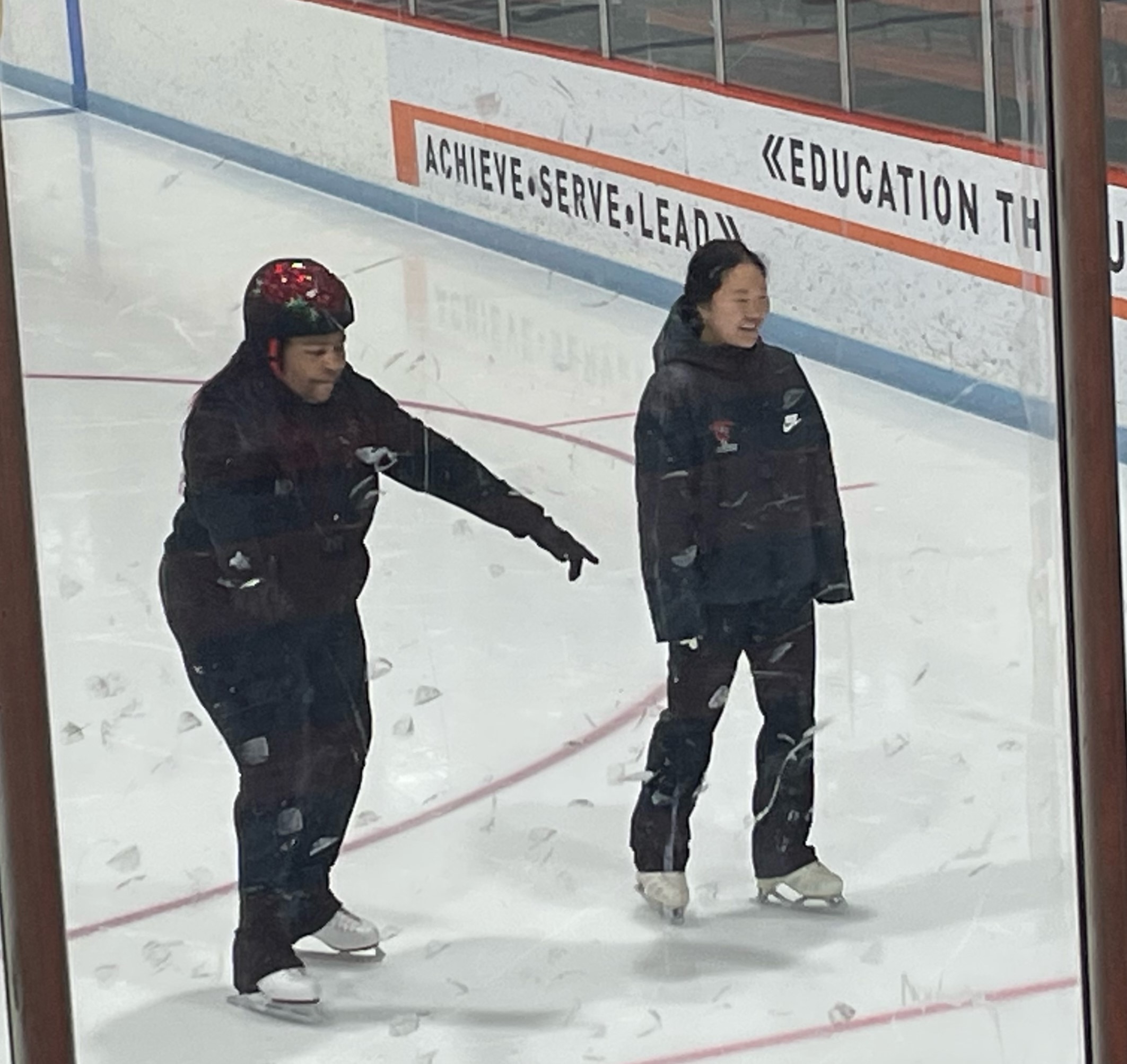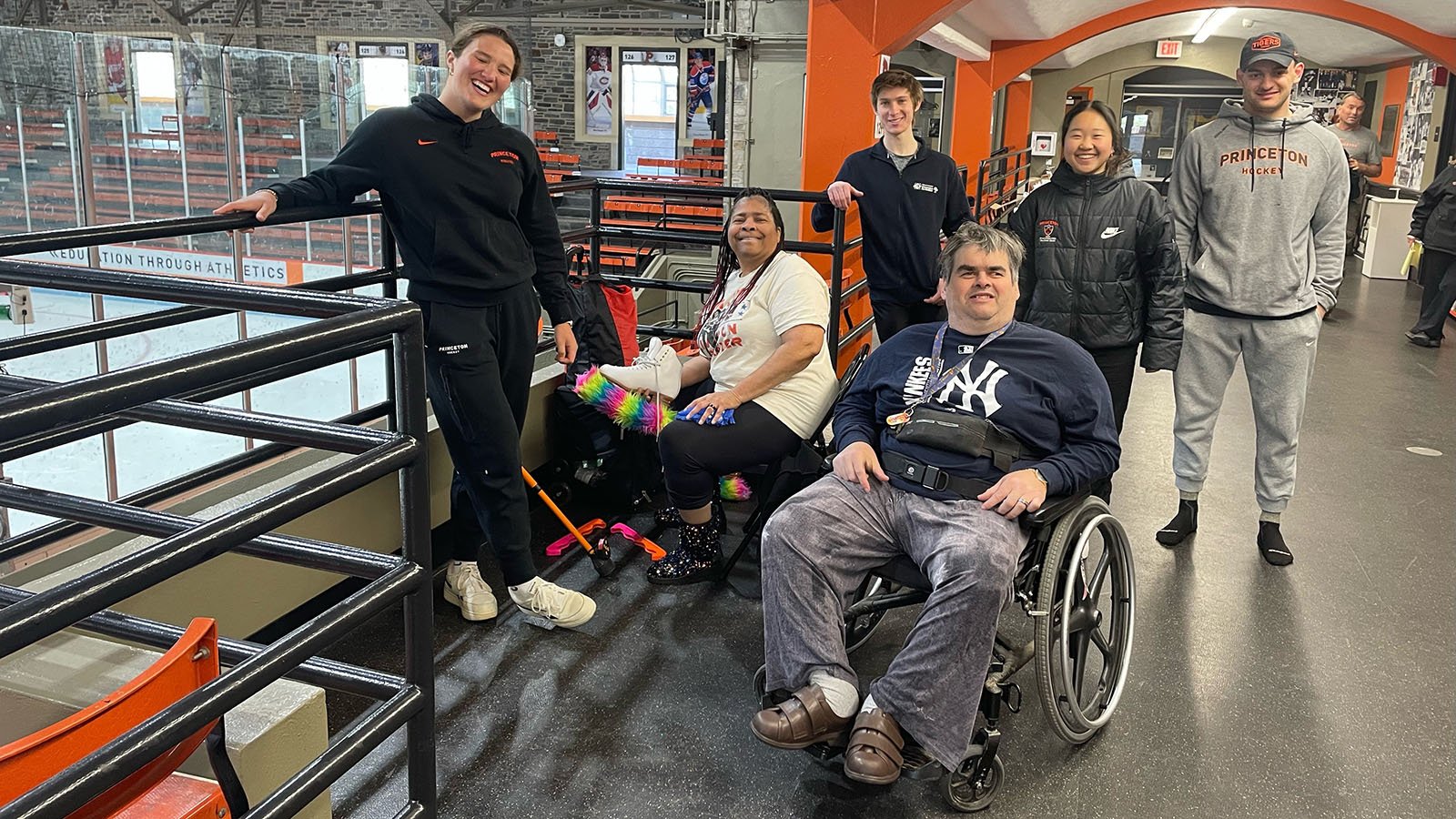Above: Special Olympic skaters Patrice Jetter (white shirt) and Garry Wickham (Yankees shirt) have found a love for skating thanks to the efforts of a group of Princeton skaters, including (l-r) Uma Corniea, Zachary Yaninek, Selena Xiang and Nick Seitz.
The following story appeared in the June/July 2024 issue of SKATING magazine. Click here to purchase a subscription.
Get up.
That is what a group of Princeton University figure skaters and hockey players do early Sunday mornings, meeting at the school’s historic Hobey Baker Memorial Ice Rink to coach skaters from the Special Olympics of Mercer County, New Jersey.

The skating program for individuals with intellectual disabilities provides hour-long, one-on-one instruction geared to each skater’s specific abilities and goals.
Zachary Yaninek, a former U.S. Figure Skating national competitor and now a sophomore member of the Princeton University Figure Skating Club (PUFSC), started the program. Yaninek had volunteered with the therapeutic skating program at his home club, the Hershey Figure Skating Club, and sought a similar opportunity in college. Working with Princeton’s Pace Center for Civic Engagement under the Student Volunteer Council, he obtained ice time and student volunteers and connected with the Special Olympics program at Ice Land Skating Center in Hamilton Township, New Jersey.
“I competed in figure skating from the time I was 5 years old until I attended Princeton,” Yaninek said. “Now I am trying to give back to the sport and to the community. It is an interesting turn that my skating journey has taken — a very rewarding one.”
In addition to Yaninek, Princeton figure skaters Selena Xiang and Audrey Zeng; men’s varsity hockey forward Nick Seitz; women’s varsity hockey goaltender Uma Corniea; and hockey club member Luke Carroll coach the Special Olympics athletes.
Two adult participants in the Special Olympics program performed in PUFSC’s spring show. Patrice Jetter and Garry Wickham are a unique pairs team — Wickham “skates” in a wheelchair. At the show they skated to “Word Up” by Cameo, with the Princeton crowd clapping to the beat and providing encouragement and support.
“This was the first time we were asked to be in a show other than at Ice Land,” Wickham said. “It was a real honor.”
He believes the Princeton Special Olympics skating program has helped his partner.
“For one thing, this is helping her confidence,” Wickham said. “I noticed that she works best one-on-one. The way Zach [Yaninek] has things set up here — this is really the thing for Patrice.”
“This is a great program at Princeton,” Jetter said. “It helps people like me learn a lot. And it is nice with Zach — there are not that many male figure skating coaches to work with us. So it is nice for Garry to be able to work with Zach and get some ideas for movements for our skating program.”
Parents of the Special Olympics skaters view the Princeton program as beneficial to their athletes because of the individualized attention.
“The instructors are able to meet each skater at his or her level,” said Lisa Hodnett whose son Tommy attends the classes. “It has also been good that each skater has worked with the same volunteer each week. Tommy really connected with [varsity hockey player] Nick and this made him want to skate better and better each week.”
Jayas Balakrishnan said his son, Ronit Jayas, just began skating this year, but he has seen a great deal of progress since the start of the Princeton program.
“In five weeks, I have seen a significant improvement because it is one-on-one instruction which is awesome,” Balakrishnan said. “I am very happy with where he is now.”
The student volunteers also benefit from the Special Olympics coaching experience. Corniea, a freshman from Edina, Minnesota, had volunteered with Minnesota Special Hockey before attending Princeton.
“Teaching kids hockey — that was always a favorite part of my week,” she said. “It was something I wanted to continue. Hockey and skating have done so much for me. I want to give back to others and to the sport.”
“Seeing these skaters enjoy learning and improving — it warms my heart,” Corniea said.
Xiang, a freshman who hails from the San Diego Figure Skating Club, said although she has been coaching for a while, this is her first time working with Special Olympics.
“Patrice and Garry are super inspiring,” Xiang said. “They have a lot of fun on the ice. It shows that everyone can be on the ice — everyone can learn to skate.”
“Years ago, they put people with disabilities in nursing homes,” Wickham said. “The idea of someone in a wheelchair skating — no one would ever have thought of that.”
“There have been a lot of changes for people with disabilities,” he said. “But there are still a lot of changes that have to go on.”

